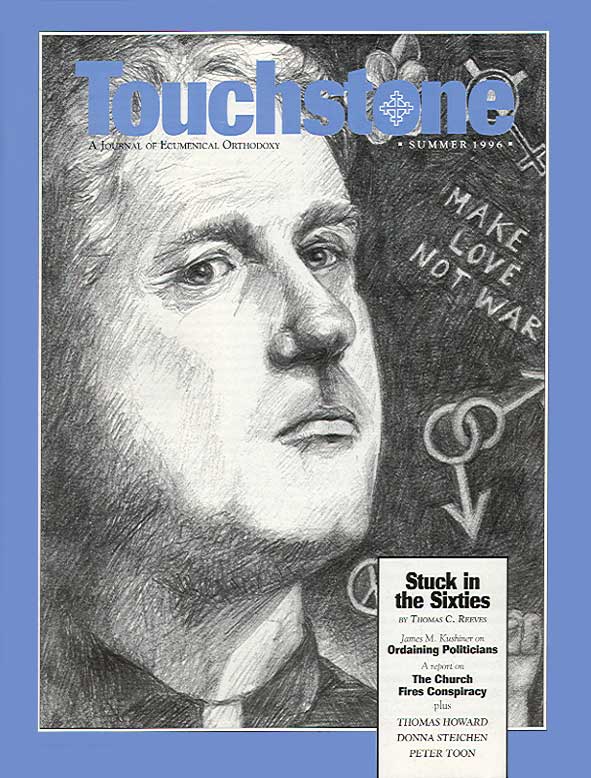Let’s Stop Ordaining Politicians
At the end of August I attended a meeting of the Religion Newswriters Association (RNA). It was not a Christian or even a religious gathering per se, except that it was for religion writers who write for the secular press, mostly newspapers. RNA members may be Muslims or Methodists, Roman Catholics or Jews, Baptists or agnostics, or even former sportswriters. Religion simply is their topic. (A major typo—“Religious Newswriters Association”—in one of the signs printed for the conference was met with groans and the rolling of many eyes.)
The meeting included two panel presentations on “Religion and Politics.” Of course one big story is the rise of the so-called Religious Right. Barry Lynn, representing Americans United for the Separation of Church and State, compared the Christian Coalition to a “900-pound gorilla” now on the loose in our nation’s political arena.
James Wall, editor of the not-so-conservative Christian Century, pointed out that the people responsible for the rise of that 900-pound gorilla were none other than himself and other mainline Christians. “My people,” he confessed, “by ignoring the spiritual aspect of their faith and concentrating on a political, worldly agenda,” have created the vacuum into which the Christian Coalition has come. Wall said that “we became so secular and partisan and so arrogant in our role”—preaching on things like the nuclear race while abandoning the task of spiritual theology—that church leaders have nothing left to say. He recounted a day in 1964 when he placed side by side the positions of the Democratic Party and the United Methodist Church and took pride in the similarities. “I now confess: that was arrogant and secular activity,” said Wall.
Wall’s remarkable confession reminded me of two fairly recent events that raise the question of religious engagement with politics. They corroborate both Wall’s point and some of the observations of Thomas C. Reeves in his new book, The Empty Church: The Suicide of Liberal Christianity (The Free Press, 1996; a chapter excerpt, “Stuck in the Sixties,” may be found on page 15 of this issue). Both events point out the transformation of the wine of religion into the water of politics as a means of salvation.
The first event took place last year when the Rev. Joan Campbell (also at the RNA meeting) and other leaders of the National Council of Churches (NCC) met with President Clinton and laid hands on him as they prayed that he have strength against the budget-cutting Republican Congress. Conservative groups, particularly the Institute on Religion and Democracy, criticized this action as blatantly partisan politics.
What is so troubling about this event? Had not conservative religious clergy also met with presidents and prayed with them and for them? What is the difference between the NCC meeting and say, Ralph Reed of the Christian Coalition or Jerry Falwell or other members of the Religious Right meeting with a conservative president and praying with him and laying hands on him?
First, I doubt that conservative clergy would lay hands on any president, even a conservative one to their liking. They might pray with him, but using the gesture of sacred religious consecration or sacred ordination would be unthinkable. It points to a deep respect for the line between the sacred and the secular. But for the liberal religious clergy and activist, as often has been said elsewhere, secular politics has become the means of salvation and that line has blurred considerably.
If for mainline liberals politics is salvation, then it makes sense to lay hands on the President, anointing him to carry out their agenda. He is one of their own. Getting into offices of political power is the whole point—it is the transfiguration of religious truth into political, earthly reality.
The politician is thus the new cleric, newly anointed by the old clerics of the secularized (and empty) church. Given such an anointing, a president might just as well wear a clergy collar, for the line between him and the clergy whose gospel is the liberal political cause left over from the sixties is essentially gone.
This means that, while the politician may become the new cleric in the liberal regime, the old cleric, in order to have a voice in politics, must be converted to liberal political causes. This brings me to that second, more recent event.
At the Democratic National Convention, the Rev. Jesse Jackson was given a prime-time slot for his speech. No one squawked about mixing religion and politics. But if a conservative clergyman had been given similar prominence in addressing the Republican convention, it would have been criticized. The difference is that Jackson is a convert to the religion of secular politics, while the conservative cleric still might talk about supernatural religion and embarrass people.
James M. Kushiner is the Director of Publications for The Fellowship of St. James and the former Executive Editor of Touchstone.
bulk subscriptions
Order Touchstone subscriptions in bulk and save $10 per sub! Each subscription includes 6 issues of Touchstone plus full online access to touchstonemag.com—including archives, videos, and pdf downloads of recent issues for only $29.95 each! Great for churches or study groups.
Transactions will be processed on a secure server.
more from the online archives
calling all readers
Please Donate
"There are magazines worth reading but few worth saving . . . Touchstone is just such a magazine."
—Alice von Hildebrand
"Here we do not concede one square millimeter of territory to falsehood, folly, contemporary sentimentality, or fashion. We speak the truth, and let God be our judge. . . . Touchstone is the one committedly Christian conservative journal."
—Anthony Esolen, Touchstone senior editor











